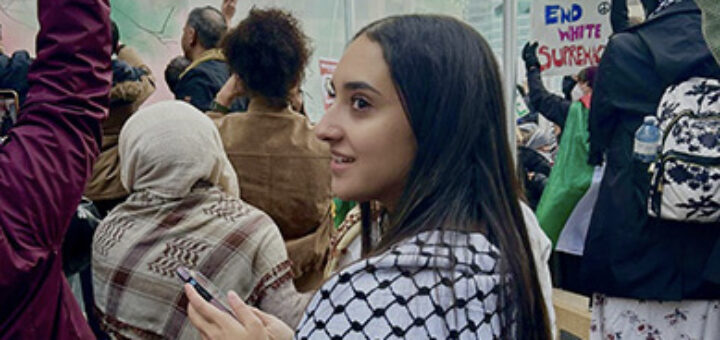Editorial: MRU’s new Palestinian Advocacy Club raises awareness on campus

By Noel Ormita, Contributor
Protests in support of Palestine and Israel have taken place side-by-side around the world since the widely covered Oct. 7 Hamas attacks. But for Palestinian students at MRU, the conflict has been happening for over 75 years.
The Palestinian Advocacy Club (PACMRU), a newly ratified club at SAMRU, aims to educate and spread awareness of the prolonged humanitarian issues in Palestine on campus. Manar Dawud, Lana Al-Digs, Noor El-Borrno and Nada El-Borrno said they started the club to share their culture and spearhead discourse with students.
A glimpse into the pages of history
The PACMRU team shared that there’s nothing new under the sun for Palestinians and war. In a joint statement, the leaders of PACMRU told The Reflector how they felt.
“This has been an on-going situation for 75 plus years,” PACMRU leaders said. “What happened as of Oct.7 was a resistance to oppression and genocide.”
The Balfour Declaration, was a public commitment made by Britain in 1917. It expressed their intention to create “a national home for the Jewish people” in Palestine. Created during World War I, it became part of the British Mandate for Palestine following the collapse of the Ottoman Empire.
While the declaration did acknowledge the importance of safeguarding the civil and religious rights of non-Jewish communities in Palestine, the British mandate was structured in a manner that prioritized empowering Jews to establish self-governance, often at the expense of the Palestinian Arabs.
The Nakba of 1948 caused mass displacement of more than 700,000 Palestinians. As Jewish immigration increased, Zionist movements pushed for an independent Jewish state according to the United Nations.
After the departure of British forces, Palestine was split into two territories, the Gaza Strip and the West Bank, where they lived under Israeli-military control.
Currently, there are approximately 7.98 million Palestinian refugees and internally displaced persons. Around 6.14 million people, including refugees and their descendants, live outside the state’s borders. These individuals reside in over 50 refugee camps managed by the UN in neighbouring countries, where they face harsh living conditions.
According to Amnesty International, many international humanitarian and war crimes have been violated, including the use of white phosphorus in warzones, unlawful killings of civilians and collective punishment, which includes the disruption of essential services like food, water and electricity.
Not a religious issue
Fawaz Saleem, a nursing student and president of the Muslim Students’ Affiliation (MSA) at MRU, said the teachings in the Quran are embedded in their club’s identity.
“If you kill one innocent person, it’s as if you’re killing the entirety of mankind,” Saleem said, quoting the Quran. “If you save one singular life, then it’s like you’ve saved the entirety of humanity.”
According to Al Jazeera, 11,470 Palestinians have been killed as of Nov. 16.
Over the years, Jews, Muslims, Christians, and believers of other religions have all claimed particular ties to Palestine.
“It has never been a religious issue,” PACMRU said. “The only thing that makes it a religious factor is that the world isn’t standing up with us because we are Muslims.”
The need for empathy
Nearly half of Palestine’s population is below 18 years of age according to a report by the Palestinian Ministry of Health in 2022.
“Many of the individuals in Gaza grow up knowing they’re probably going to die somewhere around that age,” PACMRU said.
According to a recent Mainstreet Research poll, commissioned by National Council of Canadian Muslims (NCCM), 71 per cent of Canadians agree to a ceasefire in Gaza. *
The leaders of PACMRU believe there is no space to be neutral in a humanitarian crisis. Despite a geographical disconnect, people in Canada should pay attention.
“Their tax dollars are funding what’s happening,” PACMRU said. “Stating ignorance and claiming you’re not educated enough does not excuse anything.”
In a 2021 Global Affairs report, Israel was among the top ten non-US countries Canada supplied military goods and technology to, amounting to more than $25 million. $50 million in funding was announced on Oct. 21 by the Canadian government to provide humanitarian aid including food, water and medical assistance to Palestinians in the Gaza Strip.
To scale this with recent global conflicts, since February 2022, Canada has committed more than $2 billion to Ukraine including ammunition, 300 Canadian Armed Forces members and military armory including eight Leopard 2 battle tanks.
The loaded question: what’s the solution?
With a long history of conflict in the region and previous peace agreements not honoured, a solution to the crisis is yet to be seen. But for students with deep roots in Palestine they argue it’s simple.
“They don’t deserve to be born dead,” a PACMRU leader said. “It’s all about human rights.”
#FreePalestine is a common hashtag circulating on social media. Saleem said the freedom of Palestinians requires more than a band-aid solution.
“As nurses we’re taught, don’t just look at the broken arm,” Saleem said. “Look at factors of what led to the broken arm.”
The introduction of national petitions to Prime Minister Justin Trudeau for support on a ceasefire, social media movements and boycotting is also on the rise towards brands who are supporting the conflict—drawing similarities to the Black Lives Matter movement during George Floyd’s murder.
PACMRU plans to proactively share content on their Instagram page
@pacmru, on what students can do to help rather than focusing on what to reject and event announcements.
__________________
While our printed version does not mention that this is an editorial article, edits were made to reflect the web issue of this article.
*Correction: 71 per cent of Canadians agree to a ceasefire for humanitarian aid



